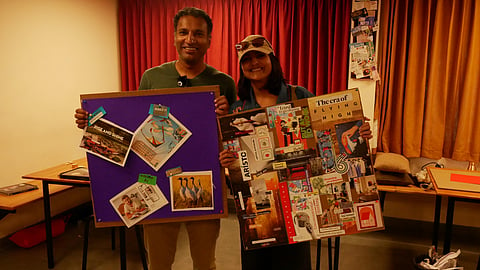
- LIFESTYLE
- FASHION
- FOOD
- ENTERTAINMENT
- EVENTS
- CULTURE
- VIDEOS
- WEB STORIES
- GALLERIES
- GADGETS
- CAR & BIKE
- SOCIETY
- TRAVEL
- NORTH EAST
- INDULGE CONNECT

Have you ever experienced a fleeting vision of your deepest desires – a perfect romance, witnessing cherry blossoms in full bloom, or standing atop the Eiffel Tower – and, for a brief moment, truly believed it was within your grasp? Often, such thoughts vanish as quickly as they appear, leaving us to dismiss them as mere fantasies.
But what if embracing and believing in these visions could actually bring them to life? That is what vision boarding promises. Balasree Viswanathan, co-founder of Improv Lore, who recently conducted her first vision boarding workshop experienced the transformative power of this practice firsthand. “It’s magic. People shy away from that word but it’s true. You can shift the fabric of your reality with the right intentions,” says Balasree.
From imagination to manifestation
In 2020, Balasree found herself in a job that seemed ideal but gradually became burdensome. She realised that her decisions were driven by fear–running away rather than moving toward something she truly wanted. This led her to create a modest vision board, placing it above her desk.
“I remember writing something very specific: ‘I am going to teach and travel internationally, at least once outside of Asia.’ I added photos of places I wanted to go, things that inspired me. Within a few months, I got an email from a theatre in Germany inviting me to teach and perform improv,” she shares.
Reflecting on this journey, Balasree notes, “It taught me that if I can’t even dream of something — if I don’t have the courage to admit to myself what I want — it definitely won’t happen.” She emphasises the importance of silencing the inner critic that imposes limiting beliefs, allowing oneself to dream and pursue goals.
Her recent vision board workshop integrated improvisational theatre tools to help participants vividly imagine their goals, engaging all senses to create a tangible experience of their aspirations. She encouraged attendees to ‘dream like children but take responsibility like adults’.
She further adds, “People often perceive their ideal selves as distant or separate from who they are now. I used to think that way too. But I’ve come to believe there’s no gap — you’re already that person. It’s more about uncovering and embracing who you are rather than chasing after an external ideal.”
Not just about setting goals
Vision boarding is more than assembling a collage of material desires; it’s an exercise in self-reflection and intentionality, starkly different from New Year resolutions. As self-mastery coach and founder of Being Meraklis, Shwetha Sivaraman, explains, “Many people think of it as simply putting a picture of a luxury car or a beach house on a board. While those goals are valid, vision boarding is much broader. It’s about any transformation you aspire to for yourself — whether it’s behavioural, emotional or related to your mindset.”
With workshops around vision boarding rapidly increasing around the city, Shwetha says, “New Year’s — despite being an arbitrary concept — often serves as a time for reflection, which is what makes it so right for these workshops.” Shwetha also points out that while this exercise does not necessarily have to be in a group, there are benefits to it. “In a group, you’re exposed to new ideas and when you share your goals, there’s a sense of accountability,” says Shwetha.
Enhancing manifestation
Incorporating unique elements into the practice, Archana Sanjay, founder of Our Magic Rainbow, specialises in ‘switchword’ products — words that activate the subconscious mind. Her vision boarding workshops introduce vision journals infused with ‘switchwords’ and number frequencies to enhance manifestation.
“Everything in the universe has a frequency and energy,” Archana explains. “By charging water with specific frequencies and integrating switchwords, we can influence our subconscious mind to align with our desires.” The workshop, priced at Rs 2,499, covered aspects like health, travel, spirituality, relationships and finances, providing participants with tools like motivational affirmations and energised pens to aid in decision-making.
What not to do?
Shwetha says that one of the biggest mistakes is skipping the reflection process. “In our workshops, we spend the majority of the time reflecting — journalling about what has worked, what hasn’t and what truly resonates. Without that foundation, vision boards can feel superficial,” she shares. Another misconception, she adds, is treating vision boards as a wish list for material possessions.